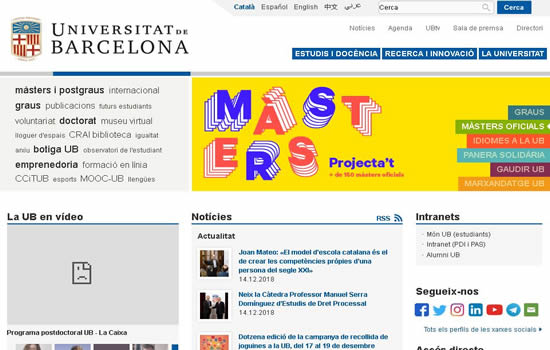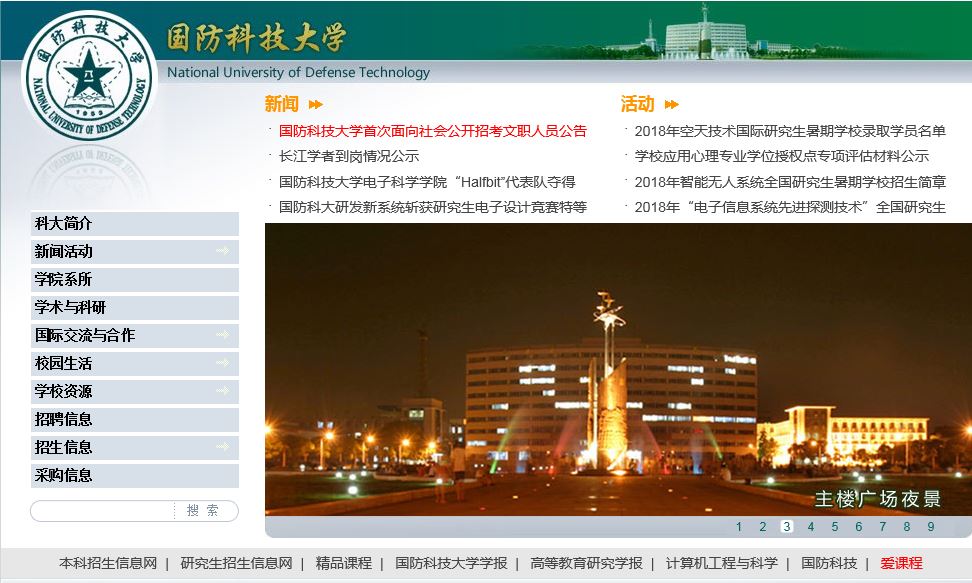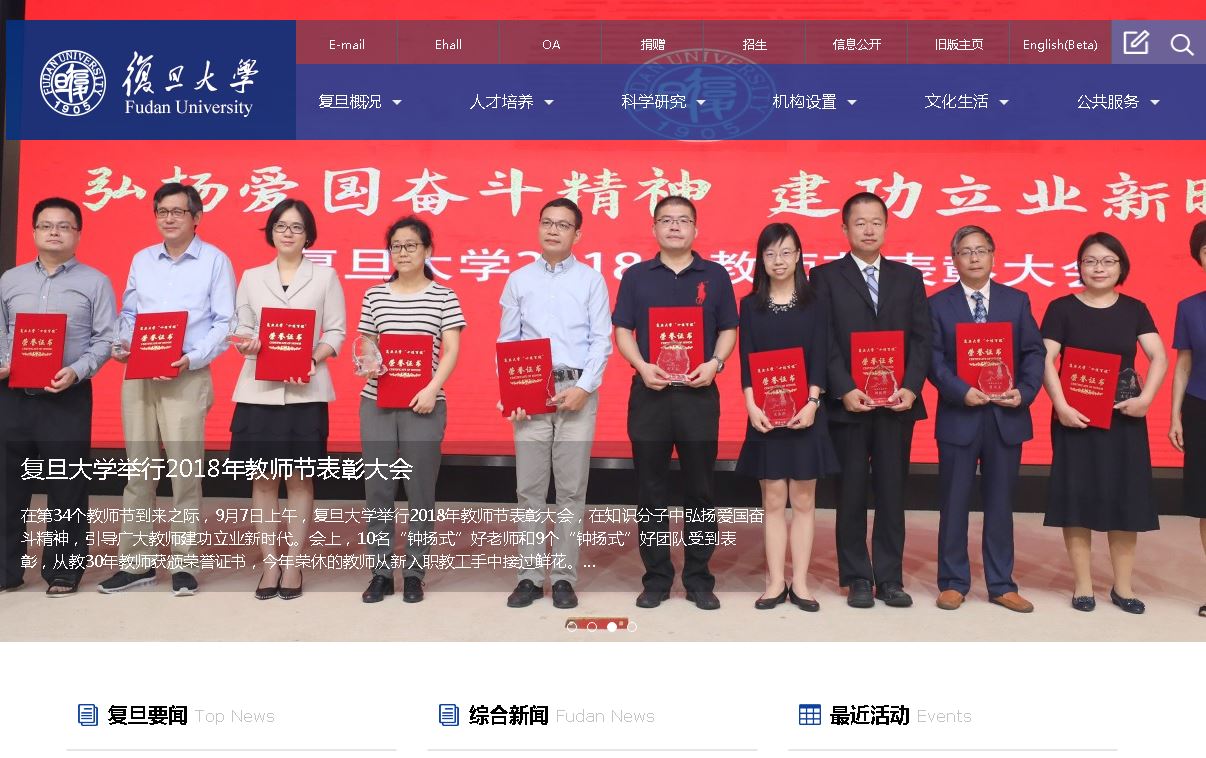选择热点
 荷兰莱顿大学
荷兰莱顿大学 西班牙巴塞罗那大学
西班牙巴塞罗那大学 巴西圣保罗大学 University of Sao Paulo, Brazil
巴西圣保罗大学 University of Sao Paulo, Brazil 台湾南华大学 University of South China in Taiwan
台湾南华大学 University of South China in Taiwan 科技大学 National University of Defense Technology
科技大学 National University of Defense Technology 南京大学 Nanjing University
南京大学 Nanjing University 上海复旦大学 Fudan University
上海复旦大学 Fudan University 泗水大学(Ubaya)
泗水大学(Ubaya) 印尼大学 universitas indonesia
印尼大学 universitas indonesia 越南某大学 Vietnam National University
越南某大学 Vietnam National University 菲律宾大学 University Of The Philippines
菲律宾大学 University Of The Philippines
双语全文 ● 鲁迅——鸭的喜剧
发布时间:2025-01-06
来源:大学网站
The Comedy of the DucksNot long after the blind Russian poet Eroshenko brought his sixstringed guitar to Beijing, he complained to me, “Lonely, lonely!
Like the loneliness in a desert!
”This was no doubt his honest feeling, but not mine: I was an old resident.
“Stay long in a room filled with iris and epidendrum, and you become oblivious of their scent.
” I simply found the place noisy.
But perhaps what I called noisy was what he called lonely.
It did seem to me though that Beijing had no spring or autumn.
Old residents said that the warmth underground had shifted northward, making the climate milder.
Still, in my opinion there was no spring or autumn; the end of winter merged with the start of summer; and as soon as summer ended, winter started.
One day, or rather one night, at this time when winter ended and summer began, happening to be free I called on Eroshenko.
He stayed in Zhong Mi’s home.
By this hour the rest of the household was in bed, and the place was very quiet.
Eroshenko was resting alone on his couch, his high brows slightly wrinkled under his long yellow hair as he thought of his travels in Burma, of summer nights in Burma.
“On a night like this,” he said, “there is music all over Burma.
Buildings, grass and trees, all have insects shrilling there.
Those different sounds merge into a most extraordinary harmony.
Now and then snakes hiss, but their hisses blend into the insect’s shrilling”He fell silent, as if eager to recapture that scent.
There was nothing I could say.
I had certainly never heard miraculous music of that kind in Beijing; so no matter how patriotic I was I could put up no defence, for although blind he was not deaf.
“You haven’t even frogs in Beijing” he sighed.
鸭的喜剧俄国的盲诗人爱罗先珂君带了他那六弦琴到北京之后不多久,便向我诉苦说:“寂寞呀,寂寞呀,在沙漠上似的寂寞呀!
”这应该是真实的,但在我却未曾感得;我住得久了,“入芝兰之室,久而不闻其香”,只以为很是嚷嚷罢了。
然而我之所谓嚷嚷,或者也就是他之所谓寂寞罢。
我可是觉得在北京仿佛没有春和秋。
老于北京的人说,地气北转了,这里在先是没有这么和暧。
只是我总以为没有春和秋;冬末和夏初衔接起来,夏才去,冬又开始了。
一日就是这冬末夏初的时候,而且是夜间,我偶而得了闲暇,去访问爱罗先珂君。
他一向寓在仲密君的家里;这时一家的人都睡了觉了,天下很安静。
他独自靠在自己的卧榻上,很高的眉棱在金黄色的长发之间微蹙了,是在想他旧游之地的缅甸,缅甸的夏夜。
“这样的夜间,”他说,“在缅甸是遍地是音乐。
房里,草间,树上,都有昆虫吟叫,各种声音,成为合奏,很神奇。
其间时时夹着蛇鸣:‘嘶嘶!
’可是也与虫声相和协……”他沉思了,似乎想要追想起那时的情景来。
我开不得口。
这样奇妙的音乐,我在北京确乎未曾听到过,所以即使如何爱国,也辩护不得,因为他虽然目无所见,耳朵是没有聋的。
“北京却连蛙鸣也没有……”他又叹息说。
“Frogs?
We do!
” This sigh of his emboldened me to protest, “In summer, after the big rains, you can hear no end of frogs croaking in the gutters, because there are gutters all over Beijing.
”“Oh”A few days later, sure enough, I was proved right, as Eroshenko bought a dozen or so tadpoles.
He put them into a miniature pool in the middle of the yard outside his window.
Three feet long and two feet wide, it had been dug by Zhong Mi to serve as a lotus pool.
Although no one had ever seen even half a lotus growing there, it was a most appropriate place to raise frogs.
Clustered tadpoles swam through the water, and Eroshenko often went over to visit them.
Once, the children told him, “Mr.
Eroshenko, they’ve grown legs.
” Then he smiled with pleasure and said, “Oh!
”But raising a poolful of musicians was only one of Eroshenko’s projects.
A great advocate of self-sufficiency, he was all in favour of women keeping livestock and of men tilling the land.
So whenever he met a good friend, he would advise him to go plant cabbages in his yard; and many a time he urged Mrs.
Zhong Mi to keep bees, poultry, pigs, cows and camels.
Subsequently, sure enough, many chicks appeared in the Zhong Mi household and flapped all over the yard, pecking it bare of the tender leaves on the ground.
This was probably the outcome of his advice.
After that, the countryman selling chicks often called, and each time they bought a few, because chicks are prone to forage for themselves and fall ill—they are seldom very long-lived.
One of them, moreover, became the central figure in The Tragedy of the Chicks, the only story Eroshenko wrote in Beijing.
One morning, unexpectedly, the countryman brought along some cheeping ducklings, but Mrs.
Zhong Mi said she did not want them.
Eroshenko hurried out too.
They put a duckling in his hands, and it cheeped as he held it.
He thought the little creature so lovable, he felt he had to buy it.
He bought four in all, for eighty cash apiece.
And those ducklings were really lovable, covered with golden down.
Set on the ground they waddled about, calling to each other and always keeping together.
Everybody praised them and said they must buy some loaches the next day to feed them.
Eroshenko said, “You must let me pay for it.
”“蛙鸣是有的!
”这叹息,却使我勇猛起来了,于是抗议说,“到夏天,大雨之后,你便能听到许多虾蟆叫,那是都在沟里面的,因为北京到处都有沟。
”“哦……”过了几天,我的话居然证实了,因为爱罗先珂君已经买到了十几个科斗子。
他买来便放在他窗外的院子中央的小池里。
那池的长有三尺,宽有二尺,是仲密所掘,以种荷花的荷池。
从这荷池里,虽然从来没有见过养出半朵荷花来,然而养虾蟆却实在是一个极合式的处所。
科斗成群结队的在水里面游泳;爱罗先珂君也常常踱来访他们。
有时候,孩子告诉他说,“爱罗先珂先生,他们生了脚了。
”他便高兴的微笑道,“哦!
”然而养成池沼的音乐家却只是爱罗先珂君的一件事。
他是向来主张自食其力的,常说女人可以畜牧,男人就应该种田。
所以遇到很熟的友人,他便要劝诱他就在院子里种白菜;也屡次对仲密夫人劝告,劝伊养蜂,养鸡,养猪,养牛,养骆驼。
后来仲密家里果然有了许多小鸡,满院飞跑,啄完了铺地锦的嫩叶,大约也许就是这劝告的结果了。
从此卖小鸡的乡下人也时常来,来一回便买几只,因为小鸡是容易积食,发痧,很难得长寿的;而且有一匹还成了爱罗先珂君在北京所作唯一的小说 小鸡的悲剧 里的主人公。
有一天的上午,那乡下人竟意外的带了小鸭来了,咻咻的叫着;但是仲密夫人说不要。
爱罗先珂君也跑出来,他们就放一个在他两手里,而小鸭便在他两手里咻咻的叫。
他以为这也很可爱,于是又不能不买了,一共买了四个,每个八十文。
小鸭也诚然是可爱,遍身松花黄,放在地上,便蹒跚的走,互相招呼,总是在一处。
大家都说好,明天去买泥鳅来喂他们罢。
爱罗先珂君说,“这钱也可以归我出的。
”Then he went off to a class, and the others dispersed.
When presently Mrs.
Zhong Mi took out some left-over rice for the ducklings, she heard a distant splashing and, running over to look, saw the four of them having a bath in the lotus pool.
They were turning somersaults too and eating something.
By the time she shooed them ashore, the water in the pool was muddy.
When eventually the mud settled, all that could be seen were a few thin lotus roots.
Not a single tadpole that had grown legs was left.
“They’ve gone, Mr.
Eroshenko, the baby frogs.
” The smallest child made haste to announce this as soon as he came back that evening.
“Eh?
The frogs?
”Mrs.
Zhong Mi came out too, to report how the ducklings had eaten all the tadpoles.
“Well, well!
” he said.
By the time the ducklings shed their down, Eroshenko had suddenly become so homesick for “Mother Russia” that he hastily set off for Chita.
By the time frogs were croaking all around, the ducklings had grown into ducks, two white, two speckled, and they no longer cheeped but had started quacking.
The lotus pool was too small for them to sport in; but luckily Zhong Mi’s compound is so low-lying that each time it rained in summer it filled with water.
Then they swam, dabbled in the water, flapped their wings and quacked joyfully.
Now the end of summer has once more merged with the start of winter,and still there is no news of Eroshenko.
There is no knowing where he is.
Only four ducks are left, still quacking in the desert.
Oct-22他于是教书去了;大家也走散。
不一会,仲密夫人拿冷饭来喂他们时,在远处已听得泼水的声音,跑到一看,原来那四个小鸭都在荷池里洗澡了,而且还翻筋斗,吃东西呢。
等到拦他们上了岸,全池已经是浑水,过了半天,澄清了,只见泥里露出几条细藕来;而且再也寻不出一个已经生了脚的科斗了。
“伊和希珂先,没有了,虾蟆的儿子。
”傍晚时候,孩子们一见他回来,最小的一个便赶紧说。
“唔,虾蟆?
”仲密夫人也出来了,报告了小鸭吃完科斗的故事。
“唉,唉!
……”他说。
待到小鸭褪了黄毛,爱罗先珂君却忽而渴念着他的“俄罗斯母亲”了,便匆匆的向赤塔去。
待到四处蛙鸣的时候,小鸭也已经长成,两个白的,两个花的,而且不复咻咻的叫,都是“鸭鸭”的叫了。
荷花池也早已容不下他们盘桓了,幸而仲密的住家的地势是很低的,夏雨一降,院子里满积了水,他们便欣欣然,游水,钻水,拍翅子,“鸭鸭”的叫。
现在又从夏末交了冬初,而爱罗先珂君还是绝无消息,不知道究竟在那里了。
只有四个鸭,却还在沙漠上“鸭鸭”的叫。
一九二二年十月。
【双语全文 ● 鲁迅——鸭的喜剧查看网站:[db:时间]】
Like the loneliness in a desert!
”This was no doubt his honest feeling, but not mine: I was an old resident.
“Stay long in a room filled with iris and epidendrum, and you become oblivious of their scent.
” I simply found the place noisy.
But perhaps what I called noisy was what he called lonely.
It did seem to me though that Beijing had no spring or autumn.
Old residents said that the warmth underground had shifted northward, making the climate milder.
Still, in my opinion there was no spring or autumn; the end of winter merged with the start of summer; and as soon as summer ended, winter started.
One day, or rather one night, at this time when winter ended and summer began, happening to be free I called on Eroshenko.
He stayed in Zhong Mi’s home.
By this hour the rest of the household was in bed, and the place was very quiet.
Eroshenko was resting alone on his couch, his high brows slightly wrinkled under his long yellow hair as he thought of his travels in Burma, of summer nights in Burma.
“On a night like this,” he said, “there is music all over Burma.
Buildings, grass and trees, all have insects shrilling there.
Those different sounds merge into a most extraordinary harmony.
Now and then snakes hiss, but their hisses blend into the insect’s shrilling”He fell silent, as if eager to recapture that scent.
There was nothing I could say.
I had certainly never heard miraculous music of that kind in Beijing; so no matter how patriotic I was I could put up no defence, for although blind he was not deaf.
“You haven’t even frogs in Beijing” he sighed.
鸭的喜剧俄国的盲诗人爱罗先珂君带了他那六弦琴到北京之后不多久,便向我诉苦说:“寂寞呀,寂寞呀,在沙漠上似的寂寞呀!
”这应该是真实的,但在我却未曾感得;我住得久了,“入芝兰之室,久而不闻其香”,只以为很是嚷嚷罢了。
然而我之所谓嚷嚷,或者也就是他之所谓寂寞罢。
我可是觉得在北京仿佛没有春和秋。
老于北京的人说,地气北转了,这里在先是没有这么和暧。
只是我总以为没有春和秋;冬末和夏初衔接起来,夏才去,冬又开始了。
一日就是这冬末夏初的时候,而且是夜间,我偶而得了闲暇,去访问爱罗先珂君。
他一向寓在仲密君的家里;这时一家的人都睡了觉了,天下很安静。
他独自靠在自己的卧榻上,很高的眉棱在金黄色的长发之间微蹙了,是在想他旧游之地的缅甸,缅甸的夏夜。
“这样的夜间,”他说,“在缅甸是遍地是音乐。
房里,草间,树上,都有昆虫吟叫,各种声音,成为合奏,很神奇。
其间时时夹着蛇鸣:‘嘶嘶!
’可是也与虫声相和协……”他沉思了,似乎想要追想起那时的情景来。
我开不得口。
这样奇妙的音乐,我在北京确乎未曾听到过,所以即使如何爱国,也辩护不得,因为他虽然目无所见,耳朵是没有聋的。
“北京却连蛙鸣也没有……”他又叹息说。
“Frogs?
We do!
” This sigh of his emboldened me to protest, “In summer, after the big rains, you can hear no end of frogs croaking in the gutters, because there are gutters all over Beijing.
”“Oh”A few days later, sure enough, I was proved right, as Eroshenko bought a dozen or so tadpoles.
He put them into a miniature pool in the middle of the yard outside his window.
Three feet long and two feet wide, it had been dug by Zhong Mi to serve as a lotus pool.
Although no one had ever seen even half a lotus growing there, it was a most appropriate place to raise frogs.
Clustered tadpoles swam through the water, and Eroshenko often went over to visit them.
Once, the children told him, “Mr.
Eroshenko, they’ve grown legs.
” Then he smiled with pleasure and said, “Oh!
”But raising a poolful of musicians was only one of Eroshenko’s projects.
A great advocate of self-sufficiency, he was all in favour of women keeping livestock and of men tilling the land.
So whenever he met a good friend, he would advise him to go plant cabbages in his yard; and many a time he urged Mrs.
Zhong Mi to keep bees, poultry, pigs, cows and camels.
Subsequently, sure enough, many chicks appeared in the Zhong Mi household and flapped all over the yard, pecking it bare of the tender leaves on the ground.
This was probably the outcome of his advice.
After that, the countryman selling chicks often called, and each time they bought a few, because chicks are prone to forage for themselves and fall ill—they are seldom very long-lived.
One of them, moreover, became the central figure in The Tragedy of the Chicks, the only story Eroshenko wrote in Beijing.
One morning, unexpectedly, the countryman brought along some cheeping ducklings, but Mrs.
Zhong Mi said she did not want them.
Eroshenko hurried out too.
They put a duckling in his hands, and it cheeped as he held it.
He thought the little creature so lovable, he felt he had to buy it.
He bought four in all, for eighty cash apiece.
And those ducklings were really lovable, covered with golden down.
Set on the ground they waddled about, calling to each other and always keeping together.
Everybody praised them and said they must buy some loaches the next day to feed them.
Eroshenko said, “You must let me pay for it.
”“蛙鸣是有的!
”这叹息,却使我勇猛起来了,于是抗议说,“到夏天,大雨之后,你便能听到许多虾蟆叫,那是都在沟里面的,因为北京到处都有沟。
”“哦……”过了几天,我的话居然证实了,因为爱罗先珂君已经买到了十几个科斗子。
他买来便放在他窗外的院子中央的小池里。
那池的长有三尺,宽有二尺,是仲密所掘,以种荷花的荷池。
从这荷池里,虽然从来没有见过养出半朵荷花来,然而养虾蟆却实在是一个极合式的处所。
科斗成群结队的在水里面游泳;爱罗先珂君也常常踱来访他们。
有时候,孩子告诉他说,“爱罗先珂先生,他们生了脚了。
”他便高兴的微笑道,“哦!
”然而养成池沼的音乐家却只是爱罗先珂君的一件事。
他是向来主张自食其力的,常说女人可以畜牧,男人就应该种田。
所以遇到很熟的友人,他便要劝诱他就在院子里种白菜;也屡次对仲密夫人劝告,劝伊养蜂,养鸡,养猪,养牛,养骆驼。
后来仲密家里果然有了许多小鸡,满院飞跑,啄完了铺地锦的嫩叶,大约也许就是这劝告的结果了。
从此卖小鸡的乡下人也时常来,来一回便买几只,因为小鸡是容易积食,发痧,很难得长寿的;而且有一匹还成了爱罗先珂君在北京所作唯一的小说 小鸡的悲剧 里的主人公。
有一天的上午,那乡下人竟意外的带了小鸭来了,咻咻的叫着;但是仲密夫人说不要。
爱罗先珂君也跑出来,他们就放一个在他两手里,而小鸭便在他两手里咻咻的叫。
他以为这也很可爱,于是又不能不买了,一共买了四个,每个八十文。
小鸭也诚然是可爱,遍身松花黄,放在地上,便蹒跚的走,互相招呼,总是在一处。
大家都说好,明天去买泥鳅来喂他们罢。
爱罗先珂君说,“这钱也可以归我出的。
”Then he went off to a class, and the others dispersed.
When presently Mrs.
Zhong Mi took out some left-over rice for the ducklings, she heard a distant splashing and, running over to look, saw the four of them having a bath in the lotus pool.
They were turning somersaults too and eating something.
By the time she shooed them ashore, the water in the pool was muddy.
When eventually the mud settled, all that could be seen were a few thin lotus roots.
Not a single tadpole that had grown legs was left.
“They’ve gone, Mr.
Eroshenko, the baby frogs.
” The smallest child made haste to announce this as soon as he came back that evening.
“Eh?
The frogs?
”Mrs.
Zhong Mi came out too, to report how the ducklings had eaten all the tadpoles.
“Well, well!
” he said.
By the time the ducklings shed their down, Eroshenko had suddenly become so homesick for “Mother Russia” that he hastily set off for Chita.
By the time frogs were croaking all around, the ducklings had grown into ducks, two white, two speckled, and they no longer cheeped but had started quacking.
The lotus pool was too small for them to sport in; but luckily Zhong Mi’s compound is so low-lying that each time it rained in summer it filled with water.
Then they swam, dabbled in the water, flapped their wings and quacked joyfully.
Now the end of summer has once more merged with the start of winter,and still there is no news of Eroshenko.
There is no knowing where he is.
Only four ducks are left, still quacking in the desert.
Oct-22他于是教书去了;大家也走散。
不一会,仲密夫人拿冷饭来喂他们时,在远处已听得泼水的声音,跑到一看,原来那四个小鸭都在荷池里洗澡了,而且还翻筋斗,吃东西呢。
等到拦他们上了岸,全池已经是浑水,过了半天,澄清了,只见泥里露出几条细藕来;而且再也寻不出一个已经生了脚的科斗了。
“伊和希珂先,没有了,虾蟆的儿子。
”傍晚时候,孩子们一见他回来,最小的一个便赶紧说。
“唔,虾蟆?
”仲密夫人也出来了,报告了小鸭吃完科斗的故事。
“唉,唉!
……”他说。
待到小鸭褪了黄毛,爱罗先珂君却忽而渴念着他的“俄罗斯母亲”了,便匆匆的向赤塔去。
待到四处蛙鸣的时候,小鸭也已经长成,两个白的,两个花的,而且不复咻咻的叫,都是“鸭鸭”的叫了。
荷花池也早已容不下他们盘桓了,幸而仲密的住家的地势是很低的,夏雨一降,院子里满积了水,他们便欣欣然,游水,钻水,拍翅子,“鸭鸭”的叫。
现在又从夏末交了冬初,而爱罗先珂君还是绝无消息,不知道究竟在那里了。
只有四个鸭,却还在沙漠上“鸭鸭”的叫。
一九二二年十月。
【双语全文 ● 鲁迅——鸭的喜剧查看网站:[db:时间]】
- 上一篇: 双语 ● 行到田田乱叶边
- 下一篇: 双语 ● 平铺十里湖光
相关阅读
目录列表
资讯列表
英语资讯


共0条评论
网友评论温馨提示:您的评论需要经过审核才能显示,请文明发言!